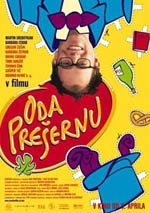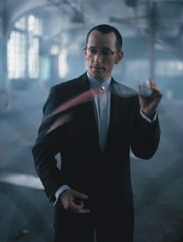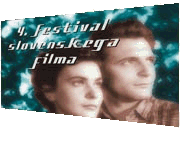The annual Festival of Slovene Film, held in the Adriatic resort
town of Portorož from 28 to 31 March, has in just four short years
become the most important showcase for the country's film industry.
The films shown at the festival represent the highlights of the
national film program and will be released to theatres throughout
the year. Many will also make the rounds of the festival circuit.
Reflecting the increased quality of, and attention given to,
recent Slovene productions, such as Janez Burger's V leru
(Idle Running, 1999) and Damjan Kozole's Porno film
(2000), this year's festival ran for an additional, fourth, day.
Last year's festival premiered four features, including Porno
film, which won four awards at the festival—the most of any feature—and went on to rave reviews at festivals around the world. The film was also successful on the domestic market, along with Miha Hočevar's Jebiga (Fuck It), which also premiered at last year's festival and broke box-office records for a domestic film when it was released soon after.
This year, the number of features rose to six, five of which
were premiering. Of the six features that were shown, half were dark
tales exploring themes of violence. Alongside them were 21
documentaries, five short films, six video art productions and four
animated films, as well as eleven short films and ten television
works by students of the Academy of Theatre, Radio, Film and Television (AGRFT), rounding out the festival's program.
This year's films
Inspired by the great success of both V leru and porno
Film, the number of features was at a record high this year. All
together, six Slovene-produced feature films were shown, along with
a Czech-Slovene co-production.
 First on the program was Martin Srebotnjak's Oda Prešerenu (Ode to the Poet). Shot in 19 days on a budget so low that the director had to play the lead role himself, the story starts when a young poet who makes his living writing jingles for commercials and wins a commission to compose an ode to the Slovene national poet Prešeren for his 200th anniversary celebrations. The film, following hot on the heels of last year's Prešeren Year 200th anniversary blowout, takes on the myths and legacy of the Slovene Romantic idol.
First on the program was Martin Srebotnjak's Oda Prešerenu (Ode to the Poet). Shot in 19 days on a budget so low that the director had to play the lead role himself, the story starts when a young poet who makes his living writing jingles for commercials and wins a commission to compose an ode to the Slovene national poet Prešeren for his 200th anniversary celebrations. The film, following hot on the heels of last year's Prešeren Year 200th anniversary blowout, takes on the myths and legacy of the Slovene Romantic idol.
Zadnja večerja, pa al' kako sta dva norca snemala film
(The Last Supper, or How Two Crazy People Shot a Film),
directed by Vojko Anželjec, was shot in just seven days. The film
starts when two people break out of an asylum, steal a video camera
and try to shoot their own movie. The only one of the feature films
on the program of this year's festival to have premiered beforehand,
Zadnja Večerja has already been seen by more than 40,000
people.
Vince Anžlovar's thriller Poker was expected to premier
at last year's festival, but due to technical problems in the
film's post-production that proved
 impossible. The delay created a huge buzz around the film this year,
which unfortunately led to disappointment for many. The so-called
"enfant terrible" of Slovene film, Anžlovar's other films include
Babica gre na jug (Babica goes south, 1991) and Oko
za oko (An Eye For An Eye, 1992). The dark film premiered
in Ljubljana on 25 April and will soon be in theatres throughout the
country.
impossible. The delay created a huge buzz around the film this year,
which unfortunately led to disappointment for many. The so-called
"enfant terrible" of Slovene film, Anžlovar's other films include
Babica gre na jug (Babica goes south, 1991) and Oko
za oko (An Eye For An Eye, 1992). The dark film premiered
in Ljubljana on 25 April and will soon be in theatres throughout the
country.
Miran Zupanič's Barabe (Rascals) is another dark
film exploring themes of crime and violence. It takes place in a
fictional, Russian-dominated, criminal underworld in Maribor.
Barabe will premier in theatres in mid-May.
Jan Cvitkovic, the star of 1998's V leru, made his
directorial debut with Kruh in mleko (marketed in English as Black and White, but actually meaning "Bread and Milk"). While not nearly as dark as Poker or Barabe, this film also deals with violence, alcoholism and its effect on families. Kruh in mleko was originally opposed to be a 15-20 minute short film, but when Cvitkovic finished filming, he found that he had 40 minutes, and decided to expand the project into a feature.
Set to hit theatres in September, Sašo Podgoršek's Sladke
sanje (Sweet Dreams) was the undisputed hit of the
festival. The story breaks with the theme of violence that ran
through many of this year's films and delves into pure nostalgia.
The film is set in Yugoslavia in the 1970s and tells the story of a
boy named Egon who wants a record player and will do whatever it
takes to get one.
Among the other highlights of the festival was Czech director
David Ondříček's Samotáři (Loners), a Czech-Slovene
co-production that has already been well received internationally. The film is set in Prague and deals with the travails of seven twentysomethings. Ondříček's first film Šeptej (Whisper, 1998) became the second most attended feature in the Czech Republic after the Oscar-winning Kolja.
Winners and losers
This year, the festival's main awards bore the name "Vesna," in
homage to the first Slovene Hollywood-style film of the same name.
Vesnas were given for best feature film, short film, feature or
documentary for television, video art work and student film, along
with best actor and actress.
Sladke sanje took home the most Vesnas, for best feature
film, screenplay and actress. It also won the Film Critic's award,
the Stop magazine award for best actress and the Synchro
award for best production.
The other films, with the exception of Zadnja večerja,
split the rest. Poker won the Vesna for best editing and
actor, Kruh in Mleko won the Stop magazine awards for
best actor and supporting role and Barabe won Vesnas for best
costume design and cinematography, the Kodak award for
cinematography and the Stop magazine award for most promising
actor.
Though it did not win any other awards, Oda Prešerenu
took home one of the most important, the Audience Choice award,
which is given according to the votes of the viewers themselves.
The annual Badjur Award for lifetime achievement went to
director Matjaž Klopčič, the second Slovene director to be shown at
the Cannes festival. His classic Vdovstvo Karoline Žašler
(The Widowhood of Karolina Žašler, 1976) was shown at the
festival, along with three of his short films. An exhibit about
Klopčič called "The Story that is Not" was also presented.
Not all fun in the sun
In an interview for Delo, the director of the festival,
Živa Emeršič Mali, said that the festival reached a point this year
where it can no longer expand within the existing organizational and
spatial parameters. Before next year's festival is prepared, the
entire concept will have to be rethought and reorganized. The major
issue is that the festival is conducted as an ad-hoc project of the
Film Fund and does not have a permanent, professional staff of its
own. For the festival to continue to improve, the first thing that
must be done is to rectify this situation.
The festival's location is also problematic. Portorož, a popular
tourist spot on the Adriatic coast, makes for a beautiful venue, but
the Avditorija, the central theatre of the festival, is not. Among
the options is building a new theatre designed specifically for the
festival, or showing some films in other towns in the Primorska
region, such as Piran or Koper.
Further, Milena Zupančič, an actress and head of one of the
festival's juries, told Večer: "When you walk out of the
Avditorija, the festival ends. It seems to me that Portorož and the
area did not really know that there was a festival going on."
Increased promotion, both domestic and international, must be
undertaken to give the festival a stronger presence.
The state of film in
Slovenia
The festival's problems, however, pale in comparison to the
greater problems filmmakers face in the country. Funding is a huge
problem. Last year's state budget allotted approximately USD 2.6
million to film activities, but this year funding was cut by more
than USD 40,000 at a time when funding should be dramatically
increasing to meet demand. The government's support for film making
in Slovenia is roughly five to ten times less than that of similar-
sized European countries, such as Denmark, the Netherlands, Greece
or Ireland.
Film students are also having financial problems. The Film Fund
cut the budget for student productions at AGRFT by two-thirds this
year. The Film Fund said that the move was caused by the high cost of
collaboration with Euroimages. After weeks of searching for a
resolution, the Ministry of Culture decided to increase its funding
to AGRFT, but added that this could not bee a long-term solution.
Hopefully, the forthcoming Law on the Film Fund of the Republic
of Slovenia will create better conditions for all
involved, through preparations for the law do not seem to be
satisfying many. The law is among those that must be aligned with EU
legislation and a draft should be passed by the Ministry of
Culture's Committee on Culture, Education, Youth, Science and Sport
just after 1 May, to be forwarded to parliament for passage at its
22 May session.
One of the main aims of the new law is to open up new avenues of
funding for Slovene filmmakers, and the current draft law calls for
a tax on film distribution and one on the public showing of films to
accomplish this.
At a conference organized by the Society of Slovene Filmmakers
last week to discuss the draft law, distributors and owners of
theatres argued that the taxes will not only ruin their businesses,
but will have an overall damaging effect on Slovene film. Ticket
prices would go up, and the number of viewers would drop, and the
money would only be enough to fund a single feature-length film at
most.
Next year in Portorož
Filip Robar-Dorin, the director of the Film Fund, told
Delo that in just the past two years, more than twenty
feature-length films—a huge number for such a small market—have been
made. Six have already been released and seven more were at this
year's festival. A further seven are in post-production and should
be ready in time for next year's festival.
Post-production, however, is not a smooth process in Slovenia,
as is evident from the year-long delay for Poker. In general, the process takes two to three times longer than in other European countries due to a lack of state-of-the-art equipment.
Robar-Dorin told Delo that within five years Slovenia
could become a "small superpower" in film, but the entire industry
must be given substantially more support from all sides—the state,
film professionals, the media and the public.
Delo conducted a small survey of 500 people last month,
and found that for all the gains made by Slovene film production in
the past several years, it has done little to draw people to
theatres. Almost 50 per cent of men and over 60 per cent of women
never go, according to the survey. For those over the age of 66,
the figure is even more depressing—85 per cent.
The country's young people seem much more interested, with
almost 40 per cent of those under 25 saying that they go no less
than twice a month. They are joined by international critics in
recognizing the great advances the national film program has made in
the past few years.
Slovenia's filmmakers, together with the Festival of Slovene
Film, are at a crossroads. Funding and other problems must be
resolved, and perhaps will be in the context of the Law on the Film
Fund of the Republic of Slovenia. In the face of the list of
problems exposed this year, next year's festival will take
considerably more work than in the past. But clearly the effort is
paying off. Several international festivals have already picked up
some of the films from this year's festival, and, domestic problems
notwithstanding, Slovene film truly does stand to make a huge
presence on the international level in the coming years.
Brian J Požun, 30 April
2001
Moving on:
Sources:
Festival
homepage
Delo
Dnevnik
Mladina
Večer




 First on the program was Martin Srebotnjak's Oda Prešerenu (Ode to the Poet). Shot in 19 days on a budget so low that the director had to play the lead role himself, the story starts when a young poet who makes his living writing jingles for commercials and wins a commission to compose an ode to the Slovene national poet Prešeren for his 200th anniversary celebrations. The film, following hot on the heels of last year's Prešeren Year 200th anniversary blowout, takes on the myths and legacy of the Slovene Romantic idol.
First on the program was Martin Srebotnjak's Oda Prešerenu (Ode to the Poet). Shot in 19 days on a budget so low that the director had to play the lead role himself, the story starts when a young poet who makes his living writing jingles for commercials and wins a commission to compose an ode to the Slovene national poet Prešeren for his 200th anniversary celebrations. The film, following hot on the heels of last year's Prešeren Year 200th anniversary blowout, takes on the myths and legacy of the Slovene Romantic idol. impossible. The delay created a huge buzz around the film this year,
which unfortunately led to disappointment for many. The so-called
"enfant terrible" of Slovene film, Anžlovar's other films include
Babica gre na jug (Babica goes south, 1991) and Oko
za oko (An Eye For An Eye, 1992). The dark film premiered
in Ljubljana on 25 April and will soon be in theatres throughout the
country.
impossible. The delay created a huge buzz around the film this year,
which unfortunately led to disappointment for many. The so-called
"enfant terrible" of Slovene film, Anžlovar's other films include
Babica gre na jug (Babica goes south, 1991) and Oko
za oko (An Eye For An Eye, 1992). The dark film premiered
in Ljubljana on 25 April and will soon be in theatres throughout the
country.
